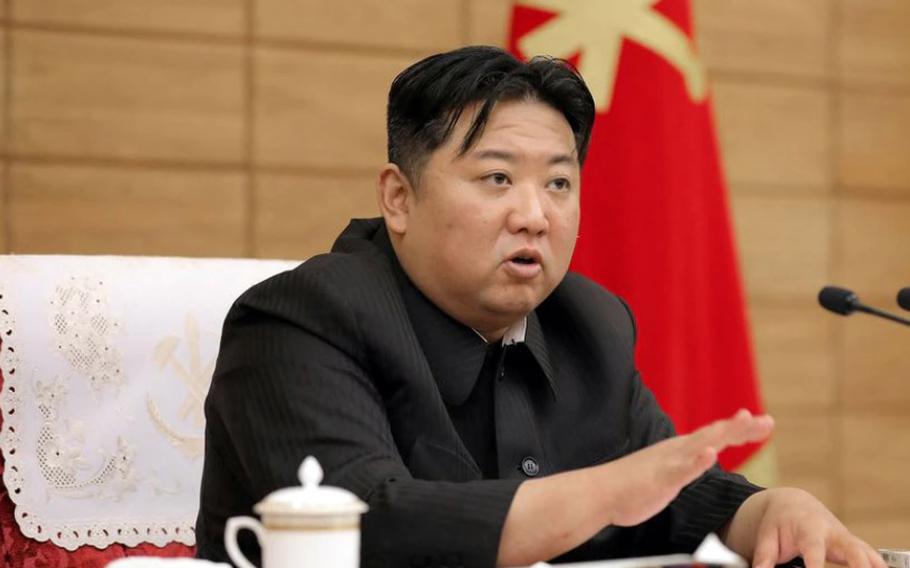
North Korean leader Kim Jong Un speaks in this undated image released by the state-run Korean Central News Agency. (KCNA)
Predictably, North Korea has rejected an offer from the South Korean government of economic aid in return for nuclear disarmament. South Korea’s new President Yoon Suk Yeol initially made the suggestion during his inauguration in May. On Aug. 15, he advanced the proposal in a speech.
In a switch from customary practice, North Korea leader Kim Jong Un did not reply. Rather, his sister Kim Yo Jong, also a senior party official in the government, on Aug. 19 rejected the offer.
She was careful to include a personal insult of Yoon, standard practice for Pyongyang. However, the fact that she appeared in place of her brother will greatly fuel rumors that he suffers from serious health problems. Yoon’s proposal nonetheless is an important gesture, especially since his government generally takes a hardline approach toward North Korea.
Undeniable is the reality that North Korea is in desperate economic difficulty. The COVID-19 pandemic has brought the nation’s long-apparent economic deterioration to a crisis point. Trade and wider interchange with China has contracted, while long-term economic sanctions under the United Nations slowly strangle commerce.
Belligerence remains the default Pyongyang position. On June 5, North Korea launched eight short-range missiles, the most ever in one day. The next day, South Korea and the United States launched the same number of missiles. North Korea also has tested a missile capable of reaching the United States.
Meanwhile, in August the 28th biennial Rim of the Pacific (RIMPAC) concluded. This is the world’s largest maritime military exercise involving extensive combined arms training. Over 25,000 personnel and 26 nations in total participated, including Japan, South Korea and the United States. This represents a strong military security context for potential military defense of South Korea and other Asia allies.
As argued in previous columns, basic realities of North Korea are unchanging. First, for many years Pyongyang has been inconsistent, often erratically. In 2013, the regime declared a “state of war” with South Korea and abruptly abrogated the 1953 armistice that ended the Korean War. Yet, accommodating moves followed. President Donald Trump conducted highly publicized meetings with Kim Jong Un, but nothing was achieved.
Second, we must emphasize defense of South Korea, within wider Asia security. The Biden administration is doing precisely this with extensive Asia trips this year of President Joe Biden and Defense Secretary Lloyd Austin.
Third, we should emphasize coordination with other nations. In 2017, Japan reenergized fitful security discussions, including Australia, India and the United States. Dubbed the Quad, this security dialogue is important.
South Korea’s substantial investment in and trade with China grows, while North Korea remains a costly dependent, though ideologically important. China’s President Xi Jinping visited Seoul in 2014. He finally visited North Korea in 2019.
China’s foreign policy reflects self-interest, and traditional caution regarding military force. North Korea is a drain, and over time a source of growing well-founded anxiety.
The brutal Korean War of 1950 to 1953 is essential background. President Harry Truman decided to support the United Nations’ defense against Pyongyang’s invasion of South Korea.
President Dwight Eisenhower quickly achieved an armistice in the Korean War. A crucial factor was devastating unrestrained bombing of North Korea. Pyongyang’s hostility today reflects this frightening history.
Democratic change in South Korea culminated with the election in 1998 of President Kim Dae-jung, heroic opponent of dictatorship. In 2000, he received the Nobel Peace Prize. During the earlier dictatorship, Kim survived imprisonment and at least one attempt to kill him. Periodic turmoil since 1998 has reinforced South Korean democracy.
U.S. leaders should emphasize collaboration with allies, underscore commitment, and continue encouraging South Korean leadership. The Biden administration is returning to traditional, very strong emphasis on working with our principal allies, including closer military cooperation.
Powerful comprehensive ties with South Korea from the Korean War, greatly reinforced during the Vietnam War, is a lynchpin.
Arthur I. Cyr is author of “After the Cold War — American Foreign Policy, Europe and Asia.”